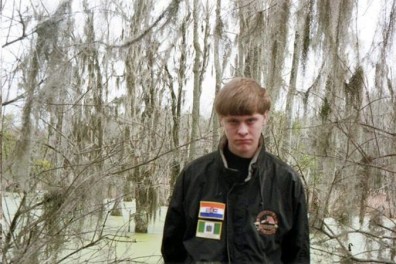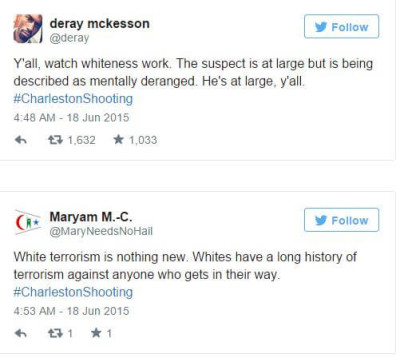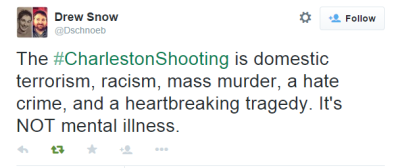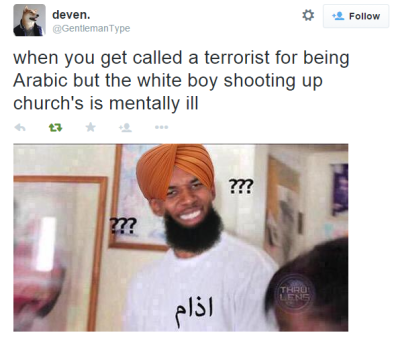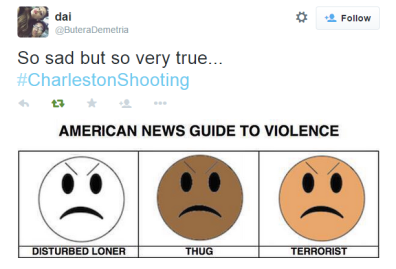I’m sure you are all familiar will the Charleston shooting that happened in June this year. If not, here’s a summary of it from Wikipedia:
“Emanuel African Methodist Episcopal Church in downtown Charleston, South Carolina, United States. During a prayer service, nine people were killed by a gunman, including the senior pastor, state senator Clementa C. Pinckney; a tenth victim survived. The morning after the attack, police arrested a suspect, later identified as 21-year-old Dylann Roof, in Shelby, North Carolina. Roof later confessed that he committed the shooting in hopes of igniting a race war.”
Source: https://en.wikipedia.org/wiki/Charleston_church_shooting
Source: http://www.nytimes.com/2015/06/19/us/on-facebook-dylann-roof-charleston-suspect-wears-symbols-of-white-supremacy.html?_r=0
The media was quick to call Dylann Roof “mentally ill,” claiming he needed help. Do a quick google search and at least half of the hits on the first page are questioning whether or not Dylann Roof is mentally ill. This isn’t to say that he didn’t have some type of mental illness, but if a black person was to commit the same crime, I doubt the media and society would have been so quick to call them mentally ill. They more likely would have been called criminal, a thug, a terrorist, or anything but “mentally ill.” So, did the media’s immediate assumption that he was mentally ill have anything to do with the fact that he was a white man? I think so, and so do a lot of others. Titles of a few articles on the topic after a quick google search were, “It’s Not About Mental Illness: The Big Lie That Always Follows Mass Shootings by White Males,” “Racism is Not a Mental Illness,” and “Shooters of Color are Called Terrorists and Thugs, Why are White Shooters Called Mentally Ill?” There’s clearly a lot of controversy over calling this young man mentally ill right off the bat. Is this a problem for you?
Take a look at some tweets shared by people who were against labeling Dylann Roof as mentally ill right after this tragic event (keep in mind – this isn’t about whether or not he was later found to have a mental illness, because yes, obviously white people can have mental illnesses…This is about the media and society’s immediate jump to call him mentally ill based on his race and gender).
Source: http://beforeitsnews.com/blogging-citizen-journalism/2015/06/charleston-shooting-the-common-thread-isnt-race-its-godlessness-2512990.html
Source: https://twitter.com/dschnoeb
Source: https://twitter.com/gentlemantype/status/611507589503807490
Source: http://site.cisternyard.com/2015/06/20/social-media-proves-that-racism-is-still-alive-in-2015/
This topic led me to do a little research and think a little deeper about how race and gender may affect our perceptions of mental illness, and how this can affect people in the criminal justice system.
According to the US HHS Office of Minority Health, black people are 20% more likely to report that they have serious psychological distress than white people. This is because they are more likely to live in poverty and crime ridden, violent areas. Even then, they are less likely than white people to be assessed for mental illness after committing a crime. According to “Gender, Race, and Mental Illness in the Criminal Justice System,” (Melissa Thompson, link: http://community.nicic.gov/blogs/mentalhealth/archive/2011/03/02/gender-race-and-mental-illness-in-the-criminal-justice-system.aspx) “Violent women, for example, are more likely to be evaluated for psychiatric conditions, while African-American men are less likely to receive psychiatric evaluation.” This quote is in reference to the courts, where it is decided whether or not a criminal should be evaluated for mental illness or if they should just receive punishment. I think, and most people would probably support this, that minorities are more likely to be considered “thugs” or “terrorists” before and after committing crimes, whereas whites are more likely to be considered “disturbed” or “mentally ill.” In addition, I think that women are more likely to be perceived as mentally ill than men are. These biases can have serious effects on a person’s life after they commit a crime. Consider a young teenage black boy who has grown up in poverty. His mother is addicted to drugs and his father was shot and killed a year ago. All of his friends and older siblings are involved in a local gang. In these conditions (or similar conditions), which are a reality for many minority youths in America, it is easy to see how a person could develop some type of mental illness. Instead of considering the environment these people grow up in and may be involved in, society just chalks these individuals up to be violent criminals when a crime is committed. But when a white person commits the same crime, we are more likely to consider them disturbed or mentally ill. Even before a person commits a crime we may have biases that lead us to believe if they will or will not commit a crime, and if they did, what their motives behind it may be. If a person is genuinely mentally ill and this was the story behind their crime, but they are seen as simply a criminal, they may not be referred to psychological evaluation and just given punishment. This type of person (and probably society, too) would definitely benefit a lot more from mental health treatment, but instead they may be locked up. Also, since women may be more likely to be considered mentally ill after a crime, and men may just be brushed off as criminal, this could leave men without the proper care and treatment they deserve if they are truly mentally ill. This could also send a woman into mental health treatment when in reality she just deserves punishment. Yes, women are more likely to have a mental illness. Minorities are also more likely to have a mental illness because of the poor conditions they live in. So, in this case, are mentally ill women receiving more of the treatment they need after criminal acts than men are? Are minorities not receiving the treatment they may need if they are written off as “thugs” or “terrorists?” If so, does this perpetuate sexism against both genders and racism against minorities? Just because men are less likely to develop a mental illness does not mean that they cannot develop one. Also, just because the majority of people living in poor, impoverished conditions are not white does not mean that white people cannot develop a mental illness. These biases that history, society, and the media have created are contributing to an unequal justice system that isn’t getting everyone the care and treatment they may need, and possibly forcing people into psychological treatment that they DON’T need. We may be locking up people who are truly mentally ill who would benefit a lot more from treatment, and we may also be passing off people as mentally ill when they aren’t. Race and gender should have nothing to do with referrals for mental health treatment or who society views as mentally ill or simply a “thug” or “terrorist,” but unfortunately they do.
Questions:
Are we more likely to assume some offenders are just mentally ill after committing a crime over other offenders because of certain biases we hold? Consider race and gender. What might some of these biases be? Why do we have these biases in the first place? What role does the media play in creating these biases? What role might history play?
Who is in charge of deciding whether a person should be assessed for mental illness or simply given punishment after a crime? Is this just the court’s job? Does society’s opinion on certain races and genders affect the court’s view on whether or not a person deserves to be evaluated for mental illness? Do we need to consider the individual’s living conditions and surroundings when deciding whether or not they deserve mental health evaluation?
